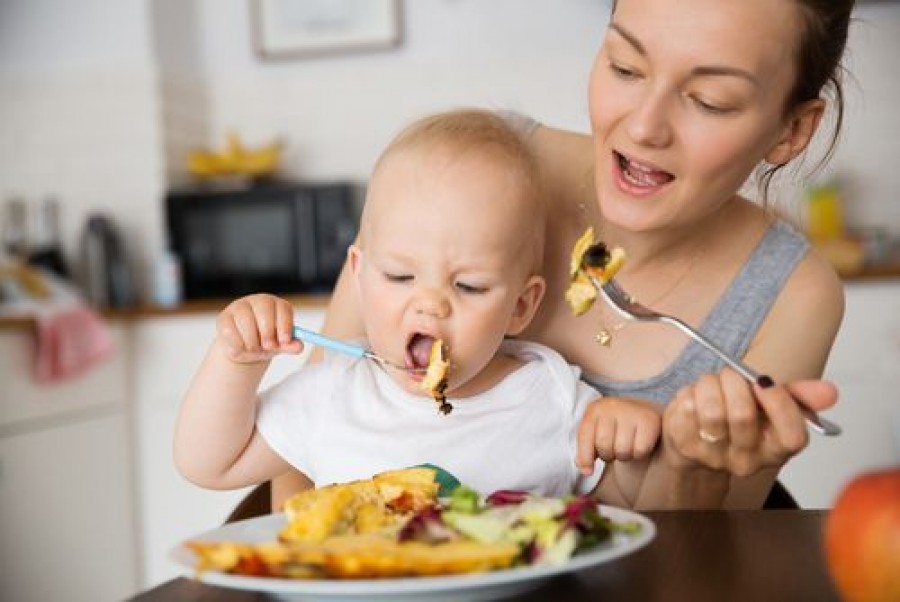Natural Baby Food Recipes

Making your own baby food gives you total control and peace of mind as a parent to what your baby is really eating. Too many canned and jarred baby foods are filled with artificial no-no’s that may have you questioning whether it’s really healthy to feed your little one ingredients that aren’t fresh and prepared at home. Luckily, there are a number of baby food recipes that don’t take a lot of time and are filled with nutritious ingredients and beneficial vitamins for your baby’s development and overall well-being.
Things to keep in mind before you get cooking:
The first thing you’ll need to consider is whether your baby is ready for solids. It’s recommended to wait until your baby is at least 6 months old before you introduce baby food into their diet. But some children have started solids from 4 months old. In these cases, it’s best to consult a paediatrician to avoid any complications.
Once you get the lowdown on whether your baby is ready for solids, think about:
· Allergies and whether your child has any food sensitivities – common allergens: eggs, tree nuts, wheat, soy, shellfish, and fish
· Asthma
· Make sure your baby can sit upright with their head up
· They will show signs of interest in solid foods
· Baby’s only need to eat about 1 to 2 teaspoons of solids in the beginning, so keep the portions small
· Be cautious of foods that cause gas, as babies are prone to colic – onions, beans, wheat, dairy and cruciferous vegies.
· Try and go organic with vegetables and include grass-fed meat (it can be a little pricier)
What age and what foods?
Different stages of a baby’s development will call for changes to their diet, so it’s important to feed your baby according to their age.
4 to 6 Months Old
At this early stage, you’ll want to introduce simple solids like purees.
1. Roast veggie puree
This is a popular choice that can’t go wrong.
Use pumpkin, sweet potato, potato, zucchini, peas, or squash and roast them on their own with a drizzle of olive oil.
Blend the roasted veggies into a smooth puree and let it cool before feeding your baby. Remember to discard any seeds and skins before roasting and pureeing.
2. Fruit purees
Incorporating fruit purees into your baby’s diet gives them some versatility and excitement with new and fresh flavours. Always opt for fresh fruit and avoid frozen or canned varieties.
Banana and mango puree is a delicious recipe that is super easy.
Peel the banana and take the pip out of the mango. Slice both fruits finely and puree until smooth. You can also add breast milk to make it a little watery, or fresh and organic pure yoghurt.
3. Turkey or chicken puree
Add meat into your baby’s diet by cooking up some lean chicken or turkey minced meat in a pan and season with a touch of salt** and pepper. Once cooled, blend until it’s smooth in consistency, while keeping the texture of the meat. You can mix the meat with pureed veggies too.
** Babies upto the age of 12 months do not require added salt – maximum salt content for babies up 12 months of age is 120 mg Sodium per day
6 to 10 months
Once your baby has reached the 9 month mark, they can begin to eat 2 to 3 small meals a day with a snack or 2 as well.
Along with the purees that your baby is enjoying, you can start to introduce other foods to their diet.
1. Eggs
Eggs are usually safe for your baby to eat at 6 months to 9 months old. The yolk is a great thickener that can be added to purees and is full of nutritional value. The whites are highly allergenic so it’s best to consult a doctor before introducing it to your baby.
2. Oats
1/4 cup rolled oats
1 cup water
Oats a delicious and nutritious addition to a baby’s early diet. But they’re only recommended after 6 months because of wheat allergies.
In a small saucepan, heat the water and add your grinded oats. Lower the heat and gently simmer for around 10 minutes to avoid sticking. Allow the oats to cool before serving them to your little one.
10 to 12 months
Your baby has now reached a pivotal developmental stage that will alter their usual diet, making it a bit easier to introduce lumpy foods with a bit more texture.
By 10 months your baby is beginning to chew, so you don’t have to puree foods until they are completely smooth, but instead you can chop ingredients instead.
1. Baby pasta recipe – mince and bolognaise
Ingredients:
· 1 cup of minced beef, lamb or chicken
· ½ onion, finely chopped
· Fresh mushrooms, sliced
· Shredded carrot
· Fresh tomatoes or puree
· ½ garlic clove – optional
· Dried herbs – oregano, mint, parsley, or rosemary and thyme
· Pinch of black pepper
· Pinch of salt **
· Olive oil to cook
· 1 cup of small pasta shapes or macaroni
** Babies upto the age of 12 months do not require added salt – max salt content for babies up 12 months of age is 120 mg Sodium per day
Directions:
Combine the garlic, onion and fresh veggies into a saucepan and sauté with the olive oil.
Once the veggies have become translucent, add the minced meat and cook until browned.
Add the tomato puree (freshly blended or tomato paste) and the fresh herbs and simmer on a low heat for around 1 hour
Cook the pasta as per packet instructions. Once it’s ready, strain and add to the sauce mixture. Stir to combine and cool before serving.
2. Chicken and bean or chickpea casserole
Ingredients:
· 1 tbsp olive oil
· 2 chicken breasts
· 1 onion, thinly sliced
· 2 tbsp organic butter
· 1/2 tbsp flour
· 1/4 cup homemade chicken stock
· 1 cup canned tomatoes
· 1 cup kidney beans, drained, or chickpeas
· Pinch of ground black pepper
· Dried herbs – oregano, thyme and rosemary
· Carrot, finely chopped
· Mushrooms, thinly sliced
Directions:
Finely slice the chicken and season it with the dried herbs and salt** and pepper. Cook the chicken in the oven, at around 200 degrees.
Sautee the onions and veggies in the butter, and add the flour (which will create a thick paste)
Add the chicken stock and bring to a boil.
Add the tomatoes and beans or chickpeas into the chicken stock mixture to create a soup-like consistency.
Pour the tomato mixture over the chicken and cook in the oven or in a stockpot together for around 45 minutes
** Babies upto the age of 12 months do not require added salt – max salt content for babies up 12 months of age is 120 mg Sodium per day
Pros of homemade baby food
· You’ll know exactly what ingredients your child is eating, which will give you peace of mind.
· The ingredients are fresh and healthy – you know when and where you’re buying them from
· Create your baby’s meal plan according to their likes, dislikes and needs
· Save money! Creating your own puree blends and baby foods actually saves you money as you can prepare food in bulk and freeze or refrigerate them in small containers (saves time too)
As you can see, introducing solids to your baby’s diet is incredibly easy, and an exciting new step for your child’s development. Experimenting with different veggies, fruit and other ingredients like organic yoghurt, cheese, eggs, oats and pasta is pivotal in creating a wholesome and nutritious diet for your baby and their needs.


